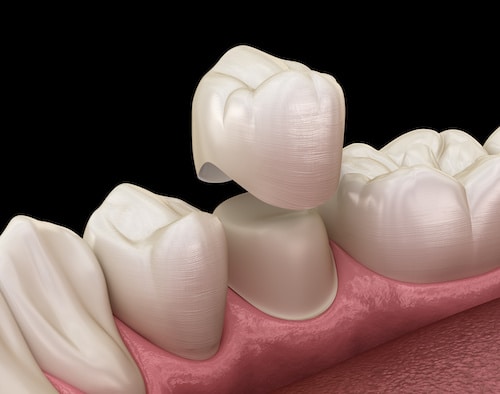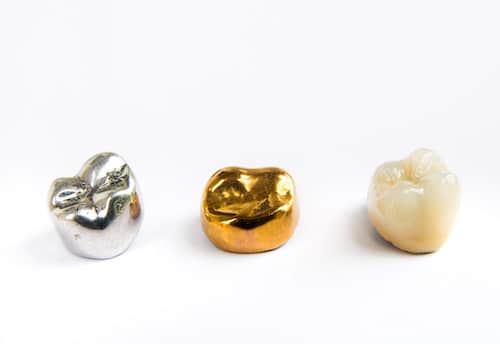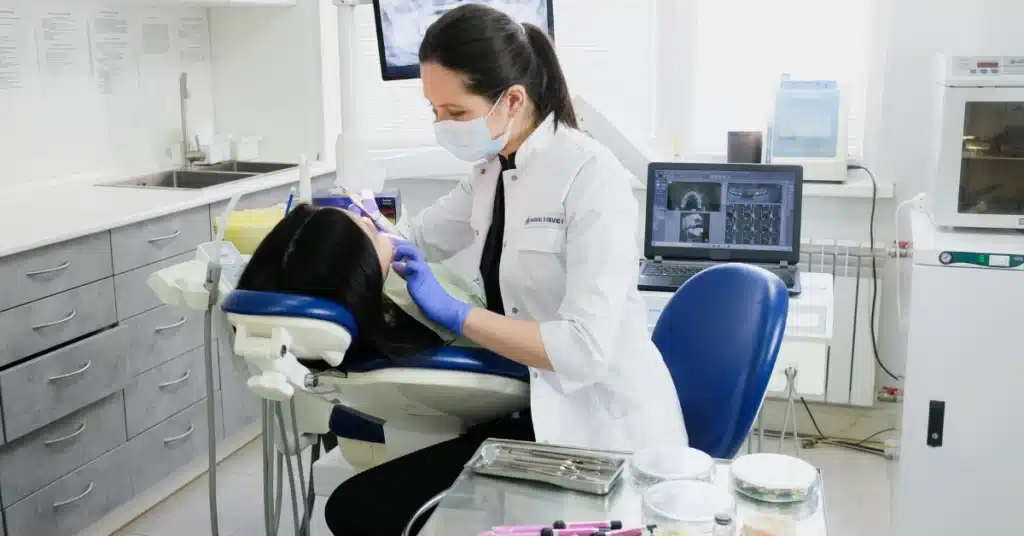Restore and Protect Your Smile with Custom Dental Crowns in Henderson & Las Vegas, NV
At Comprehensive Dental Care in Henderson, NV, we understand the importance of a healthy, confident smile. Our custom dental crowns are part of our comprehensive general dentistry services, designed to restore the function and appearance of damaged or decayed teeth, providing a durable and natural-looking solution.
What Are Dental Crowns?
A dental crown is a tooth-shaped cap placed over a damaged tooth to restore its shape, size, strength, and appearance. Crowns fully encase the visible portion of the tooth above the gum line, offering protection and enhancing aesthetics.


When Is a Dental Crown Needed?
Dental crowns are a versatile solution for restoring and protecting teeth that are weakened, damaged, or cosmetically unappealing. If your tooth is compromised, a crown can reinforce its strength while improving its appearance and function. Below are common situations where a dental crown may be recommended:
✔️ A severely decayed tooth that cannot support a filling.
✔️ A cracked or weakened tooth at risk of fracturing.
✔️ A tooth that has undergone root canal therapy and needs extra protection.
✔️ A misshapen or discolored tooth affecting your smile.
✔️ A dental implant requiring coverage to complete the restoration.
By reinforcing and restoring your tooth, dental crowns help you maintain a functional, healthy smile for years to come.
Types of Dental Crowns We Offer
We provide various types of dental crowns to suit your specific needs:
Porcelain Crowns
Ideal for front teeth, offering a natural appearance that blends seamlessly with your existing teeth.
PFM Crowns
These are porcelain-fused-to-metal crowns. They combine strength and aesthetics, suitable for both front and back teeth.
All-Metal Crowns
Made from gold or other alloys, these crowns offer exceptional durability for molars subjected to heavy chewing forces.
Zirconia Crowns
Known for their strength and aesthetics, zirconia crowns are an excellent choice for both front and back teeth.
Choosing the right type of dental crown depends on factors like durability, aesthetics, and function. Our experienced team at Comprehensive Dental Care in Henderson will help you select the best option to restore your smile with long-lasting, natural-looking results.
The Dental Crown Procedure
Our dental crown process typically involves two visits:
Tooth Preparation and Impression
During your first visit, our dentist will numb the area and reshape the affected tooth to accommodate the crown. An impression of your tooth is then taken to create a custom-fit crown. A temporary crown is placed to protect your tooth until the permanent one is ready.
Crown Placement
Once your custom crown is fabricated, you’ll return for a second appointment. Our dentist will remove the temporary crown, check the fit and color of the permanent one, and securely bond it into place.
With our precise techniques and high-quality materials, we ensure your dental crown looks natural, feels comfortable, and restores your tooth’s function for years to come. If you’re considering a dental crown, our team is here to guide you through every step of the process with expert care.
Benefits of Dental Crowns
Dental crowns are a reliable solution for restoring both the function and appearance of damaged teeth. Whether you need protection, enhanced aesthetics, or improved chewing ability, crowns provide a long-lasting and natural-looking restoration.
🔹 Restored Functionality – Enhance your ability to chew and speak properly.
🔹 Aesthetic Improvement – Achieve a natural, uniform appearance..
🔹 Durability – With proper care, crowns can last many years.
🔹 Protection – Safeguard weakened teeth from further damage.
Investing in a dental crown not only preserves your oral health but also restores your confidence in your smile. With advancements in materials and technology, modern crowns blend seamlessly with your natural teeth for a strong, comfortable, and beautiful result.

Caring for Your Dental Crown
A dental crown is a long-term investment in your oral health, but like natural teeth, it requires proper care to maintain its strength and appearance. With the right habits, your crown can last for 10-15 years or more, ensuring lasting protection and a beautiful smile.
Best Practices for Dental Crown Maintenance
✔ Practice Excellent Oral Hygiene – Brush twice daily with a soft-bristled toothbrush and fluoride toothpaste, and floss carefully around the crown to prevent plaque buildup at the gumline.
✔ Avoid Hard or Sticky Foods – Biting on ice, hard candies, or chewing sticky foods like caramel can cause cracks or loosen the crown. Opt for crown-friendly foods to extend its longevity.
✔ Wear a Nightguard if Needed – If you grind or clench your teeth (bruxism), a nightguard can prevent excessive wear and protect both your crown and natural teeth.
✔ Schedule Regular Dental Visits – Routine check-ups and professional cleanings at our Henderson office allow us to monitor your crown’s condition, detect issues early, and ensure your overall dental health stays on track.
Taking care of your dental crown is simple, but it plays a vital role in preserving your oral health and preventing future complications. By following these guidelines, you can enjoy a strong, functional, and beautiful smile for years to come!
Why Choose Comprehensive Dental Care in Henderson?
Choosing the right dental provider is key to achieving a healthy, long-lasting smile. At Comprehensive Dental Care in Henderson, we offer expert restorative dentistry, using advanced technology and a personalized approach to ensure the best results for your dental crown treatment.
✔️Experienced Team: Our skilled dentists have extensive experience in restorative dentistry.
✔️ State-of-the-Art Technology: We utilize advanced equipment to ensure precise and efficient treatments.
✔️ Personalized Care: We tailor our services to meet your unique dental needs and goals.

Schedule Your Consultation Today
A dental crown is an excellent solution for restoring damaged, decayed, or weakened teeth, and the first step is a professional consultation. During your visit, we will evaluate your dental health, discuss your options, and create a customized treatment plan to ensure the best outcome. If your tooth requires additional support, we may also discuss implant-supported crowns as part of our advanced restorative treatments at our Dental Implant Center in Henderson, NV.
If you’re considering a dental crown in Henderson, NV, contact Comprehensive Dental Care today to schedule your consultation. Our team is dedicated to helping you achieve a strong, healthy, and beautiful smile that lasts for years to come.
📞 Call us today at 702-735-3284
📍 Visit our Henderson office
Frequently Asked Questions (FAQs) About Dental Crowns
Have questions about dental crowns? Here are answers to some common concerns to help you understand the process and benefits.
What is a dental crown, and why do I need one?
A dental crown is a custom cap placed over a damaged or weakened tooth to restore its strength, shape, and appearance. You may need a crown if you have:
- A severely decayed or fractured tooth.
- A tooth that had a root canal and needs reinforcement.
- A misshapen or discolored tooth affecting your smile.
- A dental implant that requires a restoration.
How long does a dental crown last?
With good care, a dental crown can last 10–15 years or more. Longevity depends on:
- Oral hygiene – Brushing, flossing, and regular check-ups.
- Diet – Avoiding hard or sticky foods that may cause damage.
- Teeth grinding – A nightguard can help protect your crown.
What types of dental crowns are available?
We offer various crown materials based on durability and aesthetics:
- Porcelain or Ceramic – Natural look, ideal for front teeth.
- Metal (Gold or Alloy) – Extremely durable, great for molars.
- Porcelain-Fused-to-Metal (PFM) – Strength with a natural appearance.
- Zirconia – Highly resistant to wear and fractures.
Your dentist will recommend the best option for your needs.
Does getting a dental crown hurt?
No, the dental crown procedure is typically painless because the tooth is numbed before treatment begins. Here’s what to expect:
- During the procedure: Local anesthesia ensures you feel no discomfort while the tooth is reshaped and prepared.
- After the procedure: You may experience mild sensitivity or soreness for a few days, but this can be managed with over-the-counter pain relief.
- If you have dental anxiety: We offer gentle care and sedation options to ensure your comfort during treatment.
How much time does the dental crown procedure take?
A traditional dental crown procedure usually requires two visits:
1. First visit (Tooth Preparation & Impression) – The dentist reshapes the tooth, takes an impression, and places a temporary crown while the custom crown is being fabricated.
2. Second visit (Crown Placement) – Once the permanent crown is ready, it is carefully fitted, adjusted, and securely bonded into place.
For patients needing same-day crowns, advanced technology like CEREC® (Chairside Economical Restoration of Esthetic Ceramics) allows for crowns to be created and placed in just one visit.



